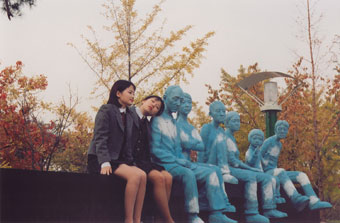The challenges of diversity
Dan Edwards

Kim Ki-duk’s Samaritan Girl
“Diversity” is Lynden Barber’s watchword for his inaugural program as the Sydney Film Festival’s artistic director. The festival guide suggests more scattershot populism, the gathering of a vast array of apparently safe choices in categories where everyone will find something they like. The approach is understandable given the festival’s ongoing financial woes, but will strategies such as utilising the George Street cinema complex for a ‘rock flicks’ retrospective attract larger audiences? Although there is no single program strand likely to generate the excitement of last year’s exhaustive Antonioni retrospective, there are certainly interesting and significant films scattered across the program incuding recent works from major filmmakers and a celebration of CAAMA’s (Central Australian Aboriginal Media Association) 25 years.
In a break with tradition the festival will open with UK film My Summer of Love (director Pawel Pawlikowski) rather than a local offering. However, there are 2 Australian premieres that look set to continue the growing trend of innovative low-budget features made outside traditional funding structures and engaging intelligently with contemporary Australian milieus. Kriv Stenders’ Cassavetes-influenced Blacktown is set in Sydney’s western suburbs and sounds far more raw that his ponderous feature debut The Illustrated Family Doctor. Mosaic, by Brisbane writer-director Aaron Catling, also promises a break with the often conservative form of Australian dramas, relying on long takes and an episodic narrative to tell the story of a father-daughter relationship poisoned by the daughter’s sexual abuse at the hands of an older man.
A genuine festival highlight is the celebration of CAAMA’s 25 years with 8 films representing some of the very best in contemporary Australian filmmaking. Ivan Sen’s new documentary Yellow Fella examines the life of actor Tom E Lewis, who played the lead role in Fred Schepisi’s The Chant of Jimmy Blacksmith in 1978. Also featured is the new documentary 5 Seasons by Steve McGregor, who directed the excellent Cold Turkey in 2003 (RT56, p18). OnScreen joins in the celebration of CAMAA’s success with Lisa Stefanoff’s account of the association’s history and achievements (p19).
The program also features some of the great names of international cinema: Angelopolous, Ruiz, Herzog, Araki and Kim. Trilogy: the Weeping Meadow is the first feature in 7 years from Greek auteur Theo Angelopoulos. It’s the first part of a series dramatising the events of the 20th century. From Chile’s legendary Raul Ruiz comes Dias de Campo, the first film the director has made in his homeland since fleeing Pinochet’s coup in 1973. South American cinema generally has been enjoying a recent resurgence, and will be highlighted with a small program of new Argentine films.
The New Asian Cinema strand features 2 works from prolific South Korean director Kim Ki-duk, whose brutal films of violent love have been festival regulars for several years. Unusually, 2 Vietnamese period films will also be screening. Buffalo Boy is a ‘Western’ set in the 1940s, while Bride of Silence, touted as “Vietnam’s first feminist film”, focuses on a young girl hounded from her 19th century village when she refuses to name the father of her unborn child.
The sheer number of strands at this year’s festival program, and the small number of films in each, means that none is likely to investigate theme, region or country in depth. However, the fact that single tickets, as well as 10, 20 and 30-film Flexi-Passes are now available should make it easier for festival goers to distill a personalised program to suit their taste.
Sydney Film Festival, artistic director Lynden Barber; State Theatre, Dendy Opera Quays, George St Cinemas, Art Gallery of NSW, The Studio Sydney Opera House; June 10-25, www.sydneyfilmfestival.org
RealTime issue #67 June-July 2005 pg. 22






